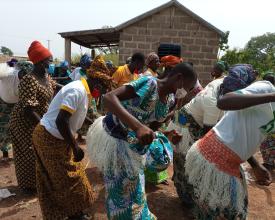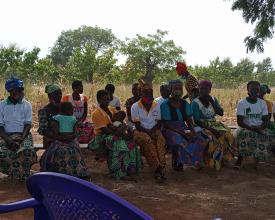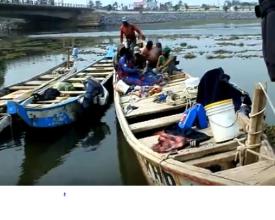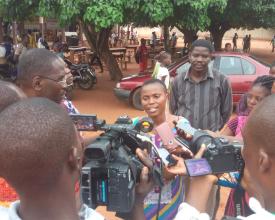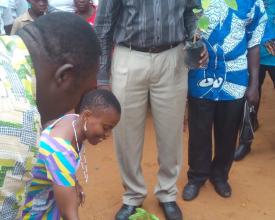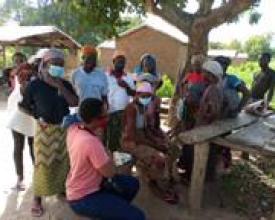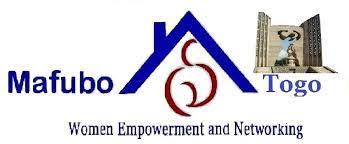
REDUCING INEQUALITIES AND PROMOTING NATURE CONSERVATION IN THE FISHING INDUSTRY
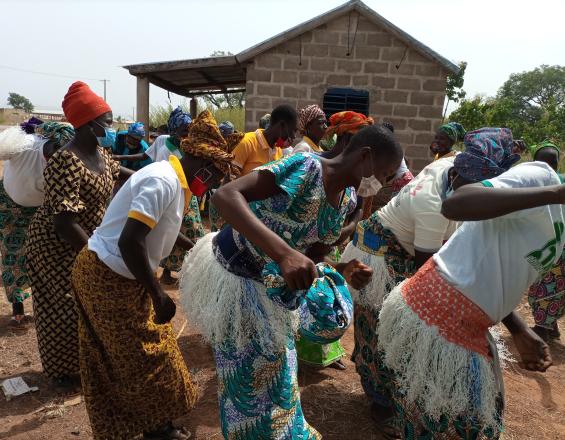
Traditionally, fishing has been a male dominated industry mainly due to the used type of tools and equipment, culture, working hours, and poor policies. The presented solution is addressing this challenge brought about by tools or equipment which is the main barrier to women. Usually fishing requires the purchase of power or manual driven canoes or boats and nets which costs are out of reach by rural women. Therefore, a simpler and cheaper technique has been introduced - the naturally made strings from which locally available baits are hanged. These strings are tied between mangrove trees. This technique enabled women to participate in fishing given the costs of equipment become affordable; the technique does not require fishing at night or far away from homes; and equipment can be carried by women without much use of physical effort.
Context
Challenges addressed
1. Mismatch between financial resources and demand (economic)
2. Long standing cultural and spiritual stereotype about women and business (social)
3. Continued availability of unethical fish catches e.g. use of small nets, use of dynamite and agrochemicals (environmental, economic and social)
4. Recovery of mangroves is taking time and this innovation need mangroves for anchoring and fish breeding (environmental)
5. Strings derived from natural products are easily and quickly biodegradable (environmental)
Location
Process
Summary of the process
Before introducing the innovation (the first building block), attempts were made to secure good relations particularly between couples and between male and female fisherfolk to avoid confrontations. We realized that the first building block cannot succeed without support from the second building block. We started by holding meetings with the main target group i.e. women to inform them about the innovation and about how some social issues ican be affected. Then we organized meetings between couples and we prioritized those with more conservative partners. Then we organized meetings between women and men to explain the innovation and its social-economic benefits. There were several meetings for almost 3 years. After 3 years we were convinced that almost 97% have a good understanding of the project and its benefits.
Building Blocks
FISHING GEAR
Traditional fishing gear excluded women from fishing because it was expensive, too heavy and neccessitated fishing at night. Strings and baits helped to overcome these challenges. Strings with baits attached are hanged in between mangrove trees close to homes. Women cast them early morning and collect their catch next day early morning.
Enabling factors
Mangroves have a high accumulation of micro-organisms, phytoplankton and other life forms that constitute the diet of different species of fish. Mangroves receive high concentration of nutrients from rivers and adjacent riparian ecosystems. Mangroves also provide shelter against predators and allows long-time fishing and safe breeding. Other enabling factors: provision of security against theft and destruction by livestock, cooperation and commitment from spouses, sound management of toxic waste and market mechanisms.
Lesson learned
We have learnt the following lessons: changes in power relations that can be brought about is important, the mangrove forest must be of the size that is adequate for all in order to avoid conflicts over the right of fishing in a particular area, the focus should not be only on fishing but on other social, economic and ecological issues as well e.g. waste management, financial management and marketing, broader protection of the environment, nutrition and health, gender equality, human rights, etc.
BUILDING POSITIVE FAMILY AND COMMUNITY RELATIONS
To introduce something which is seen as going against culture, traditions and spiritual beliefs require interactions with all members of the community. Particularly when such an introduction is perceived as intefering with the existing power relations between men and women. In this innovation, we spent almost 3 months talking to individuals, couples and groups in order to make sure each of them understands very well the project objectives.
Enabling factors
1. Adequate financial resources
2. Good understanding of what you want to introduce
3. Well organized fishing groups
4. Support from local authorities
Lesson learned
1. Your group should have both women and men. Presence of men and women in your group enhances acceptability.
2. You have to identify beforehand progressive individuals in the community and engage them as agents of change.
3. Identify those who have strong cultural, traditional, and spiritual beliefs and engage them. Leaving them out will destroy your project. If you succeed in convincing them, they will easily convince others.
4. Be sensitive to cultural and spiritual beliefs, take time, do not rush
5. Do not stop their usual way of fishing, let your idea flourish with time.
6. Promote the spirit of local ownership
RECOGNIZING OTHER ECONOMIC ACTIVITIES
Though the project focus was on the fishing industry we recognized that the women and other community members are involved in other economic activities and mainly riz-agriculture. This meant that they have additional economic activities that needed to be taken into account. Recognizing these additional economic activities generated more interest towards our project. For example instead of organizing meetings based on the fishing activity we organized them taking into account the time they spent in their farms. When needed we met them in their farms and participated in their farming activities.
Enabling factors
1. A good understanding of riz culture or other economic activities is needed.
2. Put into place a mechanism for solving problems in the other economic activities
3. Ensure a member of your staff is available all the time for consultations with them
Lesson learned
1. Projects succeed when all needs of community members are taken under consideration. Needs assessment at the beginning is extremely important.
2. Your team must be composed of experts in different fields as identified in the needs assessment
3. Cooperation from responsible national authorities is important for success of a project
LEAVE NO ONE BEHIND - USE ALL OPPORTUNITIES
Some community groups and members are not directly involved in fishing but can influence the change that you need to happen. In this project we are engaging students and their teachers, sports and arts to raise awareness and secure wider public support. We organize school debates where students debate about fishing and gender inequalities, fishing and climate change, fishing and pollution of marine ecosystem, etc in the presence of their parents. We also have traditional dancing groups to entertain and convey the message. We support school teams through provision of sports gear and organization of class and inter and intra-school competitions. We also engage school administrations to promote school afforestation for which we provide seedlings.
Enabling factors
1. Good public relations
2. Partnership with other organizations - those who are interested in other issues e.g. sports, afforestation, gender equality, etc.
Lesson learned
1. Involving each and everyone in the community speeds up achievement of your main project
2. Students and Teachers are key change agents in rural communities
3. Sports and culture are powerful vehicles through which your message can reach out your target group
Impacts
- Reducing inequality in the fishing industry, women constitute approx 35% of all people involved in fishing. In the past they were only involved in selling.
- Decrease in rural poverty particularly among women. Household incomes almost doubled.
- Increased ability to cope with COVID 19 restrictions
- Decrease in the rate of malnutrition among children by approx 30%
- Decrease in Gender-based-Violence (GBV) by almost 69%
- Decrease of almost 40% in the rate of deforestation caused by use of trees for construction of canoes and boats
- Decrease of almost 65% in the destruction of mangrove trees caused by the need to improve navigation
Beneficiaries
1. Rural women - girls, single mothers, widows, married but abandoned women, female teachers and nurses
2. Children - nutritional wise
3. Authority of the protected biosphere
4. Consumers - lowered fish prices and availability of fish throughout the year
Sustainable Development Goals
Story
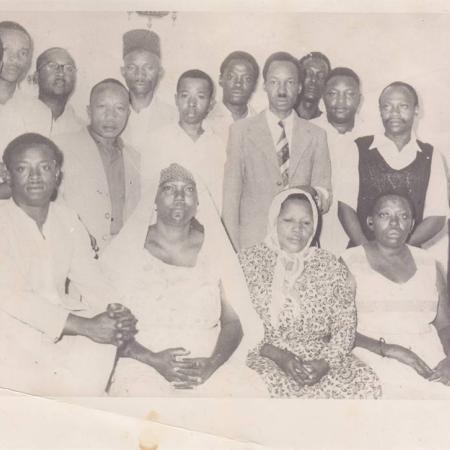
My family lived near a River called Ghona that flows from the white mountain i.e. Mount Kilimanjaro in Tanzania. My family used to survive on fishing and we were above many other families economically. I grew up with the belief that fishing can uplift families from poverty. But since childhood I asked myself why is mom and my sisters not involved in fishing? I was always told it is against culture and islam religion for them to go out at night. But I knew my mom very well. She was amongst the few women during those colonial days they were involved in the fight for independence from Great Britain. Sometimes they held meetings at night to avoid being detected by the colonial police. I used to ask myself if she can attend these meetings at night why she cannot fish at night? But in order not to look as a bad boy to my family, I kept quite; though I always believed my mother could fish better than all of us! I also wanted her to be on my side during fishing. I felt more protected with her! When I saw this in Togo in West Africa I said to myself this is the time for me to set things right!

